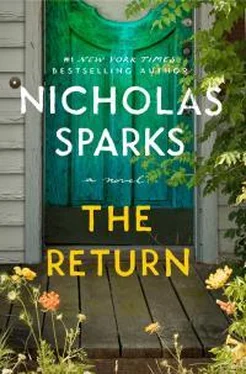She paused, frowning at the recollection. I took a sip of beer, waiting for her to go on.
“There were a pair of used candles on the counter with blackened wicks, and a half-empty box of candles as well. I also noticed that some of the dust had been wiped away at the kitchen table, like someone had eaten there. It also seemed like someone had been using one of the recliners in the family room because there was cleared space on the neighboring side table and it was the only piece of furniture in the living room that wasn’t dusty. It wasn’t anything I could prove, but just in case, I found some extra boards in the barn and sealed the back door.”
“Thanks for that,” I said.
Though she nodded, I could tell something about those memories was still bothering her. She went on. “Did you happen to notice whether anything was missing when you moved in?”
I thought about it before shaking my head. “Not that I could tell. Except for the funeral in October, I hadn’t been down here in a few years. And that week is a bit hazy in my memory.”
“Was the back door intact then?”
“I went in through the front, but I’m sure I checked all the locks when I left. I think I would have noticed if the back door was damaged. I know I spent time on the back porch.”
“When did you move in?”
“End of February.”
She digested that, her eyes flashing to the back door.
“You believe someone did break in, don’t you?” I finally asked.
“I don’t know,” she admitted. “Usually, when something like that occurs, things are broken and there’s trash strewn about. Bottles, food wrappers, detritus. And vagrants don’t usually make the bed before they leave.” She thrummed her fingers on the rocker. “Are you sure nothing was missing? Guns? Electronics? Did your grandfather keep cash around?”
“My grandfather didn’t have much in the way of electronics or cash, as far as I know. And his gun was in the closet when I moved in. It’s still there, by the way. It’s a small shotgun to keep the varmints away.”
“That makes it even stranger because usually, guns are the first things stolen.”
“What do you make of it?”
“I don’t know,” she said. “Either no one was there or you were visited by the tidiest and most honest vagrant in history.”
“Should I be worried?”
“Have you seen or heard anyone creeping around the property since you’ve moved in?”
“No. And I’m frequently awake during the night.”
“Insomnia?”
“Some. But it’s getting better.”
“Good,” she said, adding nothing more. She smoothed the pants of her uniform. “But I’ve taken enough of your time. That’s all I can really tell you.”
“I appreciate you swinging by and telling me about all this. And for fixing the door.”
“It wasn’t much of a fix.”
“It did the job,” I said. “It was still boarded up when I got here. How much longer is your shift?”
She glanced at her watch. “Actually, believe it or not, it’s over now.”
“Then are you sure I can’t get you a drink?”
“I don’t think that would be a good idea. I still have to drive home.”
“Fair enough,” I said, “but before you go—and since you’re off, and I’m new in town—tell me what I need to know about New Bern these days. I haven’t been here in a while.”
She paused, arching an eyebrow. “Why would I do that?”
“Aren’t you supposed to protect and serve? Think of this as the serve part. Like fixing my door.” I tried out my most winning smile.
“I don’t think that being a welcoming committee is part of my job description,” she deadpanned.
Maybe not , I thought, but you haven’t left yet .
“All right,” I said. “Tell me what made you want to become a sheriff.”
With my question, she looked at me. Maybe, truly, for the first time, and again I found myself transfixed by the color of her eyes. They were like the waters of the Caribbean in an upscale travel magazine.
“I’m not the sheriff. That’s an elected position. I’m a deputy.”
“Are you avoiding my question?”
“I’m wondering why you want to know.”
“I’m a curious person. And since you helped me out, I feel like I should know at least a little about the person who did the helping.”
“Why do I get the impression you have an ulterior motive?”
Because you’re not only pretty, you’re obviously smart as well , I thought. I shrugged, feigning innocence.
She studied me before finally responding. “Why don’t you tell me about yourself first.”
“Fair enough. Ask away.”
“I’m guessing that the mortar round is the reason you’re no longer in the Navy or a doctor?”
“Yes,” I said. “I was hit by a mortar just as I was leaving the hospital where I worked. Lucky shot. Or, for me, unlucky. Fairly serious injuries. In the end, the Navy put me on disability and let me go.”
“Tough break.”
“It was,” I admitted.
“And you’re in New Bern because…?”
“It’s only a temporary stay,” I said. “I’m moving to Baltimore this summer. I’m starting a new residency in psychiatry.”
“Really?” she asked.
“Is there something wrong with psychiatry?”
“Not at all. It’s just not what I expected you to say.”
“I can be a good listener.”
“It’s not that,” she said. “I’m sure you are. But why psychiatry?”
“I want to work with veterans with PTSD,” I said. “I think there’s a need for it these days, especially with soldiers and marines doing four or five rotations. As I mentioned, it can stay with a person after they’re back.”
She seemed to be attempting to read me. “Is that what happened with you?”
“Yes.”
She hesitated and I had the sense she continued to really see me. “Was it bad?”
“No question,” I said. “Terrible. And it still is, every now and then. But that’s probably a story for another time.”
“Fair enough,” she offered. “But now that I know, I’ll admit that I was wrong. It sounds like it’s exactly what you should do. How long is a psychiatric residency?”
“Five years.”
“I’ve heard residencies are hard.”
“It’s no worse than being dragged by a car down the highway.”
For the first time, she laughed. “I’m sure you’ll do fine. But I do hope you find some time to enjoy our town while you’re here. It’s a beautiful place to live, and there are a lot of good people here.”
“Did you grow up in New Bern?”
“No,” she answered. “I grew up in a small town.”
“That’s funny.”
“But true,” she said. “Can I ask what you intend to do with the place? When you leave?”
“Why? Are you interested in buying?”
“No,” she said. “And I doubt I could afford it.” She brushed a strand of hair from her eyes. “Where are you from, by the way? Give me a quick sketch of who you are.”
Pleased that she was interested, I gave her a brief history: my youth in Alexandria, my parents, my regular summertime visits to New Bern when I was younger. High school, college, medical school and residency. My time with the Navy. All with a touch of the modest hyperbole men use when trying to impress an attractive woman. As she listened, her eyebrows twitched more than once, but I couldn’t tell whether she was fascinated or amused.
“So you’re a city boy.”
“I beg to differ,” I protested. “I’m from the suburbs.”
Her lips turned up slightly at the corners, but I couldn’t read the intent behind it.
“What I don’t understand is why you went to the Naval Academy. If you were such a brilliant student, I mean, and were accepted at Yale and Georgetown?”
Читать дальше











![Николас Спаркс - Каждый вдох [litres]](/books/414723/nikolas-sparks-kazhdyj-vdoh-litres-thumb.webp)
